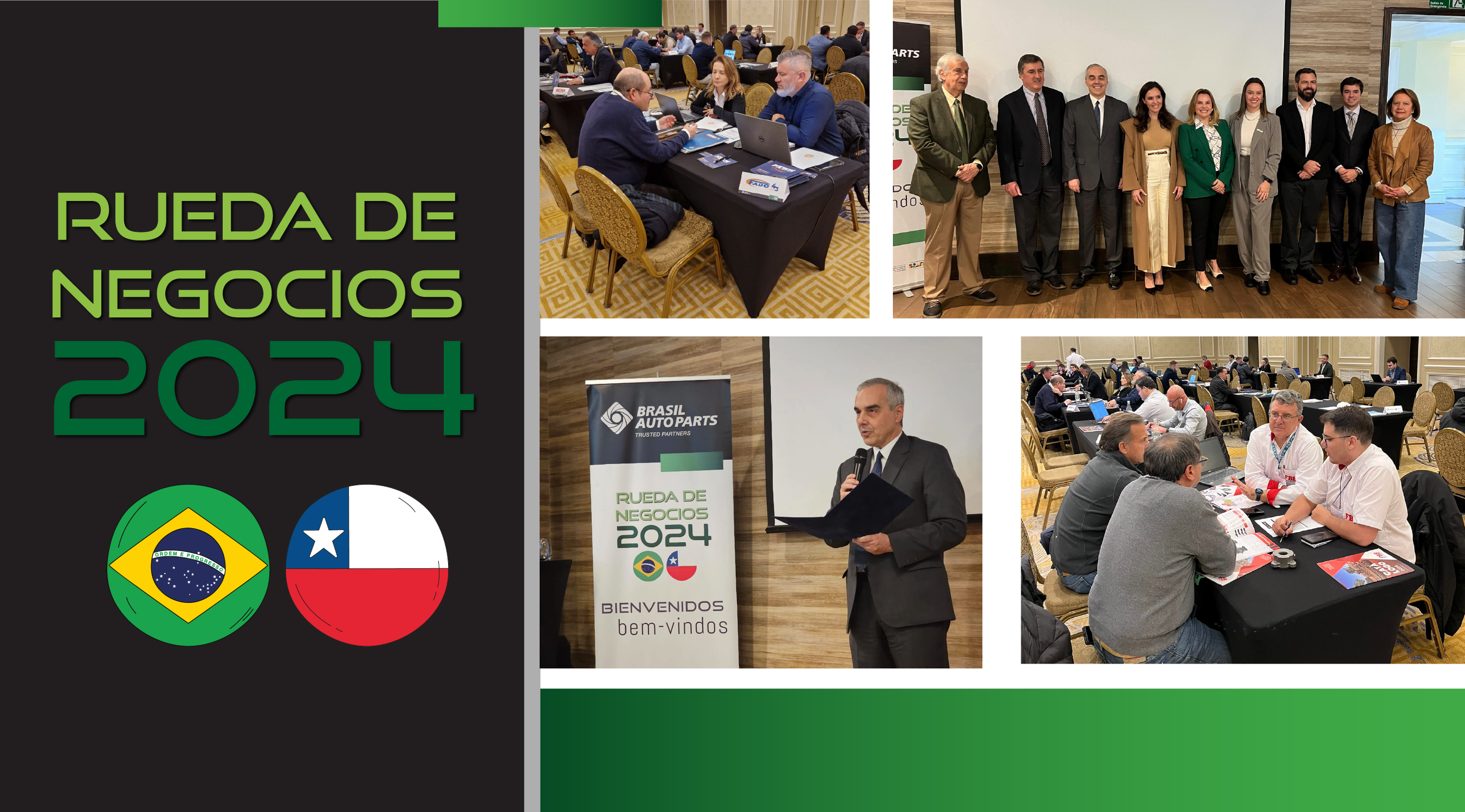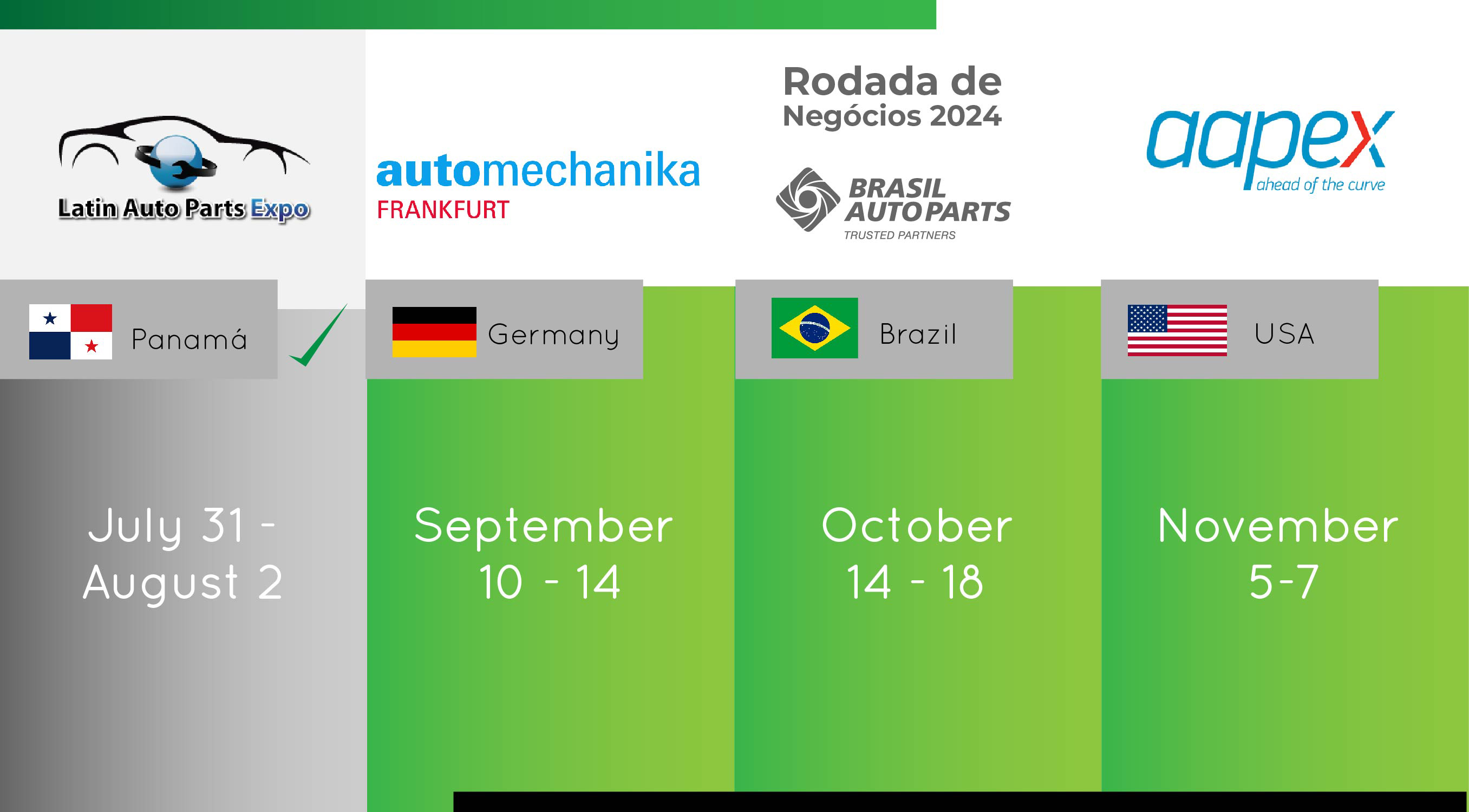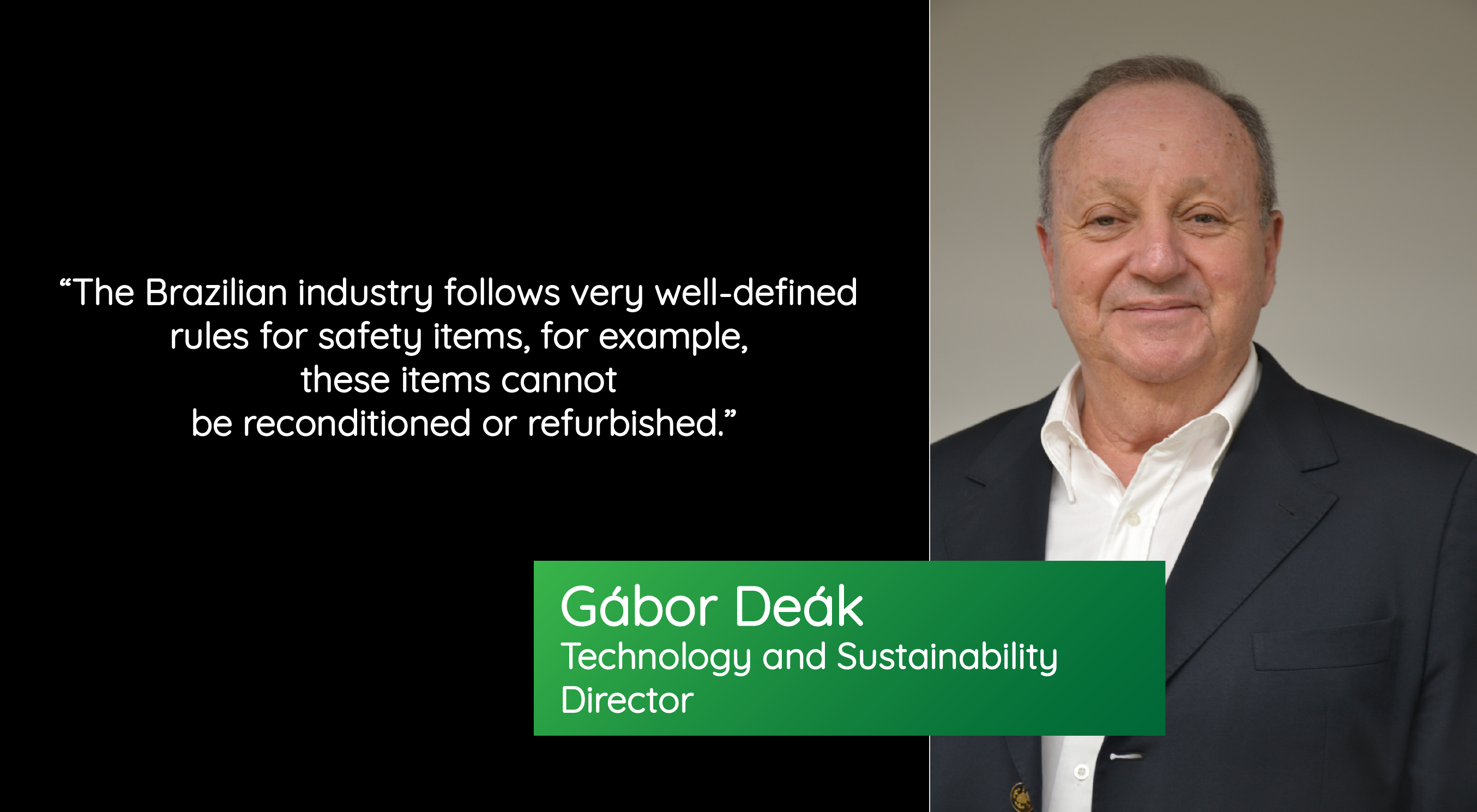
| Trade mission to Chile exceeds expectations | ||
 |
||
Thirty-one companies participated in the event organized by Brasil Auto Parts, which produced immediate results and opened prospects for business deals that could exceed five million dollars in the next 12 months. Between June 10 and 14, representatives from a total of 31 auto parts manufacturers had a full schedule in Chile, with activities involving customer activation and search for new customers and distributors. They attended lectures, made technical visits, and participated in business rounds (350 meetings with 45 local importers). By the end of the event, they had made 379 business contacts, and earned $1,839,500 in immediate business deals. In addition, a revenue of more than $5.0 million in new business is expected over the next months. The opening ceremony was attended by the Ambassador of Brazil in Chile, Paulo Pacheco; the President of Carep (Chilean Chamber of Commerce of Automotive Spare Parts and Accessories), Hernán Quezada; and Selma Nunes, from CCBC (Chilean-Brazilian Chamber of Commerce), who stressed the importance of cooperation between countries. “We are very pleased to learn of the positive results of the mission. The total number of 350 meetings with Chilean buyers and Brazilian auto parts manufacturers, and the business prospects for more than $5.0 million in the next year, are evidence of the fruitful collaborative work we have carried out. The technical visits to Chilean distributors are also a reflection of our efforts and our effective collaboration,” said Quezada. “This was the largest delegation we received here in Chile. Although Chilean auto parts importers would rather visit suppliers at world fairs, they were interested in the event and attended it because of the high quality of business contacts, which are backed by our association and the Brasil Auto Parts Project. It was a great experience that will certainly lead to good business deals,” said Guillermina Torres, Public Relations at Carep. |
||
| Global fairs are the highlight for Brasil Auto Parts in Q3 and Q4 | ||
 |
||
Panama, Germany, Brazil, and the United States are the stage for trade promotion initiatives developed by the project. Between July 31 - August 2, 23 Brazilian auto parts manufacturers were co-exhibitors at the Brazilian Pavilion of Latin Auto Parts, an international auto parts fair held in Panama City. The goal of boosting exports from the Brazilian automotive sector to the Latin American market was achieved because Panama stands out as an important logistics and trade hub for Central America and the Caribbean. The participation of Brazilian companies generated $772K in immediate business and the expectation of $4.64 million in new business deals for the next 12 months. The pavilion organized by BAP welcomed visitors from several Latin American countries, such as Panama itself, Guatemala, Honduras, Costa Rica, El Salvador, the Dominican Republic, Ecuador, Honduras, Nicaragua, Jamaica, Trinidad and Tobago, Guyana, Mexico, Argentina, Bolivia, Chile, Colombia, Peru, and Venezuela. The Vannucci Group has been operating in Central America since 2015. "In Panama, our presence is stronger in the bus parts market," says Piero Camargo, the company's trader. "For us, Latin Auto Parts was a positive surprise, as we received visitors from all over Latin America, and there are opportunities to develop and expand the product line for the local fleet," says the group’s Export Director, Janice Greco. Held from September 10 to 14, the traditional Automechanika Frankfurt is the next fair on the calendar, and 48 Brazilian companies have confirmed attendance. The fair is crucial for the automotive industry, as it showcases innovations and trends in sustainability, digitalization, and electric and self-driving vehicles. It takes place every two years and is organized by Messe Frankfurt. More than 4,000 exhibitors from more than 80 countries are expected to participate in the 2024 edition, attracting a significant global audience. The 14th edition of Rodada de Negócios Brasil (“Brazil Business Round”) will take place from October 14 to 18. This event brings together auto parts manufacturers and importers from several countries for a series of strategic meetings that can open up opportunities for trade development and partnerships. BAP is responsible for liaising between Brazilian companies and importers, as well as promoting business rounds and technical visits. To wrap up the year, 23 Trusted Partners will exhibit in the Brazilian pavilion at the AAPEX Show, to be held at The Venetian Las Vegas from November 5 to 7, 2024. This event showcases new products from US and international companies operating in the automotive aftermarket. With this sequence of events, the quality of Brazilian auto parts is expected to become increasingly recognized globally. If you are interested in visiting us or meeting us at any of these events, please contact us through our website or our social media profiles. |
||
| Safe auto parts are a priority in the Brazilian automotive market | ||
 |
||
Compliance with legislation, technological advances, and anti-counterfeiting measures in the sector are part of the agenda for the quality of auto parts manufactured in Brazil. In this edition, we interviewed Sindipeças’ Director of Technology and Sustainability, Gábor Deák, to talk about the strict safety controls applied to auto parts, the regulatory flows required for the commercialization of components, and the quality guarantees that protect consumers. We also discussed the role of Sindipeças in ensuring quality and preventing the trade of counterfeit parts, as well as the challenges and technological advances in the industry. Finally, we addressed the alignment of Brazilian standards with international ones, and the investments needed to ensure continuous excellence in the sector. 1. The automotive industry in Brazil is of extreme importance to the economy and has a world-class quality standard. In this scenario, how are product safety controls generally implemented? The safety of locally produced auto parts is supported by extensive legislation: Brazil’s Road Traffic Authority (Contran) and the National Institute of Metrology, Quality and Technology (Inmetro) have approved resolutions for assembly of vehicles and components sold in the aftermarket, respectively. There are also the norms published by the National Council for the Environment (Conama) that are applicable to our sector. 2. Auto parts are regulated by the Brazilian government through agencies such as the National Department of Transit (Senatran) and Inmetro, so what procedures do manufacturers need to follow to be allowed to sell their products? For original parts, used in automotive assembly lines, they must follow the criteria established by automakers and the government through the agencies I mentioned in my previous answer. Specifically in the aftermarket, there are strict regulations for safety items, in addition to other standards of the Brazilian Technical Standards Association (ABNT). 3. As far as quality is concerned, what guarantees are offered to the auto parts consumer market in Brazil? The first law, which needs to be met by all sectors of the economy, is the Consumer Protection Code, which is a federal law. There are also industry-specific and quality-related certifications. In addition, ABNT, Inmetro, and other agencies have set their own standards. 4. Is Sindipeças involved in quality inspection or have committees focused on enhancing the quality of Brazilian auto parts? Sindipeças receives complaints from its associates about unfair competition and forwards them to the competent authorities in charge of deciding what must be done. Besides, the entity has its own Quality Committee and participates in two others: one with the National Association of Automotive Vehicle Manufacturers (Anfavea), and one with Anfavea and the Institute of Automotive Quality (IQA). 5. Regarding safety items, how prepared is the Brazilian auto parts industry to meet the market demands? What technologies are involved? The Brazilian industry follows very well-defined rules for safety items, for example, these items cannot be reconditioned or refurbished. Other components must meet the requirements set by official agencies, especially Inmetro. Unfortunately, control is still incipient in e-commerce, although some platforms have already set up barriers to auto parts ads. 6. Does Sindipeças participate in any movement to prevent counterfeit parts from being traded in the market? Sindipeças takes its own measures and it also keeps open communication with Inmetro, the Institute of Weights and Measures (IPEM), and the Ministry of Development, Industry, Trade, and Services – MDCI . We also spare no efforts to achieve regulatory convergence among Mercosur member countries. Our activities include medium and long-term measures. 7. Are regulatory standards in force in Brazil aligned with international standards? Can the local industry fully meet them? The local industry meets the standards of domestic customers. Since approximately 70% of auto parts are purchased by multinational manufacturers, we are prepared to meet any international standard. Additionally, the sector exports to around 180 different markets. Major multinational auto parts manufacturers have been producing in Brazil for decades, which means that various standards are already in place. 8. Finally, how do you describe the sector’s level of investment to comply with standards and ensure the quality of Brazilian auto parts? The auto parts sector is prepared to follow the investment cycle announced by automakers. When there is predictability (demand), our companies also increase their investments. The expected amount for 2024 is about R$6.2 billion, which is 6.5% higher than that of the previous year, and it is very likely to increase in the coming months. We have not broken this indicator down into type of investment, but surely much of that amount will be invested in innovation, quality, and process improvement. When seeking auto parts suppliers, customers should try to understand how companies operate in terms of quality and safety. So be sure to check the websites of Senatran (Portuguese only) and Inmetro. |
||
| Artificial intelligence is a competitive advantage in managing the productive process | ||
 |
||
SEG Automotive proves that investing in new technologies is effective and increases competitiveness. The Brazilian subsidiary of SEG Automotive, a publicly traded multinational that has been manufacturing starter drives and alternators in Brazil since 1953 to serve the integrated automotive market and aftermarket of Latin America, has recently embraced artificial intelligence (AI) as part of its production process. As is widely known, the use of AI is currently seen as a new revolution in the way of living, working, and producing in today’s society. In this scenario, Rogerio Nakamura, SEG’s Innovation Manager, told us about the company’s experience with technology. According to Nakamura, “the starting point was an innovation project for the supply chain to develop enabling strategies and use industry 4.0 concepts, focusing on management and automation. So, we’ve been adopting well-known technologies to reduce costs, improve the process and, as a result, gain competitiveness in the market. We are getting ready for the future, planning for the next 10 years,” says Nakamura. To boost the process, SEG has sought support in government programs for research and development, like Nova Indústria Brasil/Mover, and entered into partnerships with associations, research institutes, and universities. “Capacity building, use of credit lines, uncertainty management, and partnerships are the basis for SEG to mature this project. “Our ambition is to run tests, expand the use of AI within the organization, create product lines, register patents, and even find paths for a new business“, said the company’s Innovation Manager. In practice, the use of new technologies has been a great competitive advantage for SEG, which focuses on open innovation, partnerships with research centers, and employee training to leverage skills. Nakamura said that “Sindipeças offers crucial support, since it implements best practices, shares knowledge about the use of government incentives, and fosters the development of the whole Brazilian auto parts industry.” “Although the results obtained by SEG cannot be published yet for strategic reasons, the company has undoubtedly entered the universe of AI and expects that all auto parts manufacturers and consumers of products made in Brazil can largely benefit from this modernization of the industry,” Nakamura said. |
||
In this context, one of the trends that have shaped B2B sales is the multichannel or omnichannel strategy, which adapts to the continuous emergence of new tools and social media platforms. The participants of Brasil Auto Parts are on the lookout for these new ways of doing business, and they rely on studies and market research to serve their customers with the highest quality, whether in the Brazilian or the international market. |
||
 |
|
|
